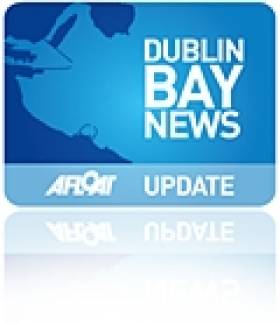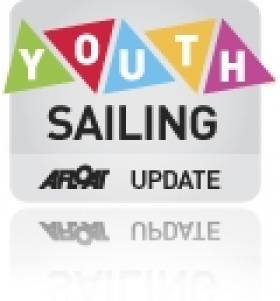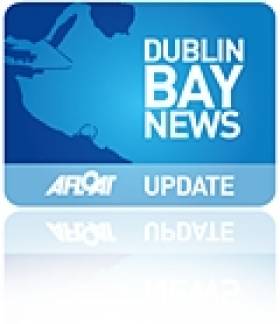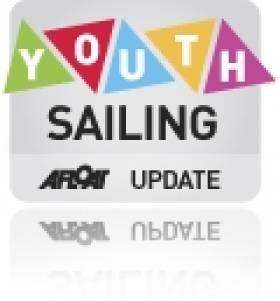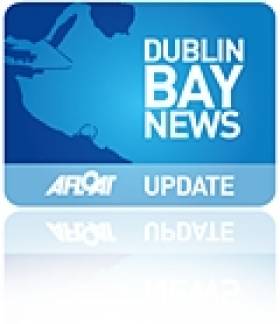Displaying items by tag: Irish National Sailing School (INSS)
Gales No Obstacle for Irish National Sailing School Winter Sailing Programme
#inss – The Irish National Sailing Club (INSC) Race Training Team that usually competes on a Sunday morning in the DBSC Spring Chicken series were welcomed yesterday morning in Dun Laoghaire by gusts of 30-40 kts writes Kenneth Rumball.
The mood in the INSC was of disappointment that for the second time in this series the race training crews would be unable to go racing on the INSC 1720 Sportsboats. Later while travelling over to the Royal Irish Yacht Club (RIYC) pontoons where the boats are kept during the winter months in our launch, the lack of activity of boats on the marina and in the Royal Irish Yacht Club coupled with code flag N flying from the marina flagstaff confirmed our suspicions that racing would indeed be cancelled for the day.
Undeterred our crews returned to the INSC clubhouse where Kenneth gave an brief lecture on how to use a compass most effectively in inshore yacht racing both pre-start and during the race. During this one of the crew members of Adelie a 34.7 from the National Yacht Club that is now crewed by a mixture of INSC staff and INSC graduates suggested a race between the current crew of Adelie and the INSC Race Training Team.
Challenge Accepted!
A quick agreement that Kenneth and Alexander would act as race officer and mark layer respectively, our Race Training Team and the Adelie crew left the INSC Clubhouse to take our fleet of Squibs out for some racing inside the Harbour.
Despite gust of 30+ kts, 5 squibs with two reefs and crewed by two persons headed out for three races. INSC staff were put under pressure by INSC graduates with one particular staff member only winning a race due to an INSC graduate coming a little too close to the last leeward mark! Close racing in our fleet of identical modified Squib keelboats ensured it was the best sailors who won the races and not the fastest boat! The Race Training Team who would usually expertly crew the 1720s were now putting their helming skills to the test while Alexander gave race coaching during the races to ensure everybody learnt as much as possible from the day!
A fantastic morning that meant our sailors were still able to take to the water and learn despite both the DBSC Spring Series and DMYC Frostbites being held ashore.
Youth Sailors Brave Chilly Waters at Dun Laoghaire for Sailing School Fun
#inss – There were plenty of thrills and spills in Dun Laoghaire harbour last weekend when local youths took to the chilly February waters as part of the Irish National Sailing School's year round sailing syllabus.
The Irish National Sailing School Junior Club is a way for young sailors to keep sailing during the school terms. Sailors have a choice of sailing either from 10am to 1pm or from 2pm-5pm on Saturdays.
While they primarily sail in dinghies, on the particular cold days children take out fleet of keelboats (1720s and Squibs) allowing them to keep sailing and stay warm in the colder conditions. Sailing on the bigger keelboats also broadens the children's skills and allows them to venture further afield.
Children from as young as 7 are out sailing in the club every Saturday combining the fun and skills of sailing while making new friends and socialising says centre principal Kenneth Rumball. 'There are always plenty of spaces available with new sailors welcome to sign up at any stage', he adds.
The Summer term is running on the following Saturdays February 1, 8, 15, 22 March 1, 8, 15, 22, 29 April 5, 26 May 3, 10. During the 13 weeks children build on their sailing skill and progress through their logbooks to ensure they are learning all the time and gaining extra valuable skills along the way.
For full dates, time and prices see the Junior Club Sailing website
Ahoy Me Irish Hearties as “Treasure Island” Sets Sail for TV Screenings
#ON THE TV-It's just over a year ago to when filming took place for parts of the TV Movie "Treasure Island" off Dalkey Island, as previously reported on Afloat.ie. Fans of the classic Robert Louis Stevenson 18th century tale can look forward to this new two-part adaptation starring Eddie Izzard as the one-legged pirate, Long John Silver, on New Year's Day on Sky 1 HD at 7pm and also at the same time on 2nd January, writes Jehan Ashmore.
Joining the Emmy award winning Izzard is BBC TV series Spooks actor Rupert Penry-Jones and Hollywood stars Donald Sunderland and Elijah Wood.
The nautical scenes where set on board Square Sails tallship, the barque Earl of Pembroke which used Dun Laoghaire Harbour as a base. During the Irish scenes, the production crew and members of the cast had to endure the bitterly artic-like conditions of last winter's big freeze as the 174-tonnes barque was off The Muglins Lighthouse with a camera-equipped helicopter whirling above.
Following the shoot in Ireland which involved Dun Laoghaire based Parallel Film Productions and the Irish National Sailing School (INSS) which provided marine co-ordination services for the drama commissioned by Sky 1 HD TV Chanel, the shoot re-located to Puerto Rico in the Caribbean.
To watch a first look-official trailer of the long-awaited swashbuckling adventure click HERE and for more about the drama including a Q&A with the cast click HERE.
- Dublin Bay News
- Treasure Island
- Parallel Film Productions
- Dun Laoghaire Harbour
- Irish National Sailing School (INSS)
- Dalkey Island
- INSS
- Eddie Izzard
- Robert Louis Stevenson
- Rupert PenryJones
- The Muglins
- Maritime TV Programmes
- Sky 1 HD Channel
- TV Movie 'Treasure Island'
- Donald Sunderland
- Eliyah Jones
- On The TV
- BBC TV series Spooks
- Square Sails
- The Muglins Lighthouse
Dun Laoghaire 'Needs Master Plan To Move Harbour Forward'
In a letter to The Irish Times last week, the principal of Ireland's largest sailing school hails the introduction of the new 'master plan' for Dun Laoghaire Harbour.
Alistair Rumball, director of the Irish National Sailing School (INSS), argues that the harbour's current financial model "cannot bring us forward".
He highlights the seasonal nature of the harbour's core businesses, which include a ferry service, four private yacht clubs, the Commissioners of Irish Lights (CIL) and the public marina and boat yard.
"Due to seasonality these operations cannot financially support the harbour all year," he writes. "We need the same numbers of the public to be using harbour facilities at mid- summer as mid-winter."
Hello 'Halloween' Sailors
The week will feature sailing, kayaking, surfing, body boarding, power-boating, arts & crafts and orienteering. Prices start from €99 per child* (where multiple children are booked).
For further information about the Dun Laoghaire based sailing activity centre and bookings contact the INNS Tel: 01 2844195 or logon to www.inss.ie/Halloween_2010/Default.284.html
Film To Seek "Treasure Island" in Dublin Bay
The 145-foot Earl of Pembroke, a three-masted barque will be centre-stage. Shooting is expected to start in early November for the made for TV movie which is to be broadcast in two parts.
Dun Laoghaire's strategic location on Dublin Bay with close proximity of Dalkey Island, Killiney Bay and Wicklow Mountains to the south coupled with the backdrop of Howth Peninsula, will provide plenty of scope for cinema-photography.
With the Earl of Pembroke to be based in Dun Laoghaire, the harbour town is also home to the film's production company Parallel Film Productions which has included works such as Amongst Women, Breakast on Pluto and the TV series, The Clinic for RTE. In addition the locally based Irish National Sailing School (INSS) on the West Pier, aside from operating sailing activities, have also built up a strong reputation in marine-support and equipment services for film, TV and advertising. Projects have included the films, Saving Private Ryan, Into The West and TV series The Tudors.
The 350-tonnes, Earl of Pembroke is by no means just a floating prop. Launched as Orion, the vessel was built at Pukvik, Sweden in 1948 and for nearly three decades she sailed the North Sea on the timber trade from the Baltic Sea to British ports until laid-up in Denmark in 1974.
The vessel lanquished for several years but in 1979, Cornwall based Square Sail purchased her. In 1985 the vessel underwent a complete restoration programme and in 1994 the vessel re-emerged as a 18th century barque. Among the many film roles, she became the HMS Hotspur in the TV series 'Hornblower'. This year the vessel was involved in a major pirate themed mini-series for French TV which was shot in Corsica. Square Sail's specialisation in providing 'tall-ships' for the film industry also includes the vessels, Keskalot and Pheonix.



























